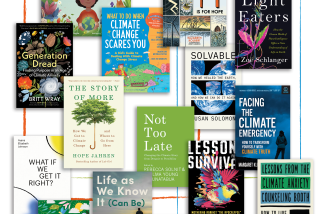‘The Age of Earthquakes’ looks back instead of forward
- Share via
I’m of two minds about “The Age of Earthquakes: A Guide to the Extreme Present” (Blue Rider: unpaged, $15 paper). On the one hand, this collaboration between writers Douglas Coupland and Shumon Basar and curator Hans Ulrich Obrist aspires to be a hip, up-to-the-moment set of riffs on our current age of anxiety, a book that functions, so to speak, like the Internet.
On the other, if I want a book to function like the Internet, I’ll just use, um, the Internet.
“The Age of Earthquakes” is not about earthquakes — not the physical sort, at any rate. Early on, the authors attempt a loose link: “The carbon that fuels our electronic life is melting the ice caps,” they write. “The shifting weight of millions of billions of tons of melting ice is relieving vast gravitational pressure from the Earth’s crust.”
Except for a passing reference to the 2011 Japanese earthquake, however, this is not a connection they push. Rather, the idea is to produce a contemporary analogue to “The Medium Is the Massage,” the 1967 mash-up that sought to address its own age of anxiety by recasting Marshall McLuhan’s ideas on media and culture as a series of slogans and collages, rendered in graphic form.
“All media work us over completely,” McLuhan wrote. “They are so pervasive in their personal, political, economic, aesthetic, psychological, moral, ethical, and social consequences that they leave no part of us untouched, unaffected, unaltered.”
A similar idea motivates “The Age of Earthquakes,” which argues that the Internet has rewired not just how we interact with time, community, identity, but these very aspects of our lives themselves. “Your 20th-century linear mind has been rewired into a 21st-century lattice,” its authors declare.
This is not a new idea; in his 2010 book “The Shallows,” Nicholas Carr writes compellingly about the effects of digital life on our brain chemistry. But “The Age of Earthquakes” means to take a broader approach.
“… everybody on Earth is feeling the same way as you,” Coupland and Basar write, describing let’s call it digital anxiety, the sense that there is something going on that we ought to know about, that we need to be connected all the time. “The last time humanity had so much in common was when a few remaining cave people sat out the last Ice Age.”
Later, they elaborate: “At the moment we don’t know which will triumph: The individual or the mob.”
That’s a resonant question, although more, I think, in terms of politics, global and otherwise. We live in an era of mass narrative, mass hysteria, from ISIS and what we do about it to the debate over funding the Department of Homeland Security, which exploded into messy chaos Friday night.
None of that, though, is playing out especially on the Internet; these are real world issues, real world concerns. In the face of that, “The Age of Earthquakes” seems too facile, too self-satisfied.
One problem is that its sloganeering seems too generic, too easy. “Photographing your salad turns it into a ghost,” the book insists, trying (but not quite succeeding) to frame a critique about fetishizing food.
The point is that if we are constantly recording, posting everything, we experience nothing, that authenticity is up for grabs. As it happens, I agree with that, but “The Age of Earthquakes” ends up playing into the superficiality it decries.
Partly, it’s the effect of all these statements, one after the other, like a succession of bullet points. Partly, it has to do with a certain knowing flipness, which renders the book too clever by half.
But most of all, it’s that “The Age of Earthquakes” undercuts itself by its very existence, by the form it takes (between two covers), not to mention its self-conscious engagement with McLuhan. It is, in other words, a project that looks backward, rather than ahead.
“People say that we create technologies which alienate us,” the authors insist, “but the fact is that anything made by humans is a de facto expression of humanity. Technology cannot be alienating, because humans created it. Genuinely alien technologies can only be created by aliens.”
Yes, yes, I get it. Nothing new under the sun. And yet, what does this mean for where we are or where we’re going? “The Age of Earthquakes” claims to want to tell us, but the truth is no one knows.
twitter: @davidulin
More to Read
Sign up for our Book Club newsletter
Get the latest news, events and more from the Los Angeles Times Book Club, and help us get L.A. reading and talking.
You may occasionally receive promotional content from the Los Angeles Times.











